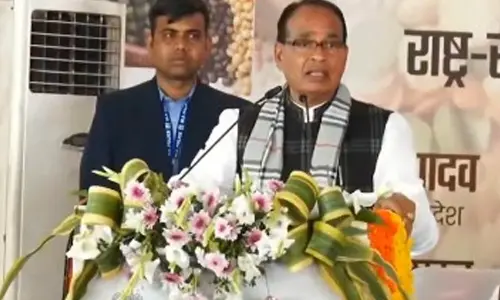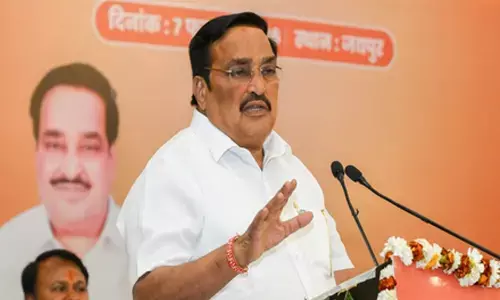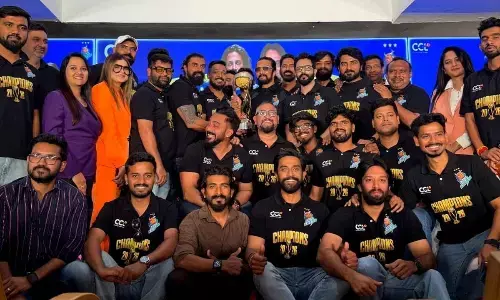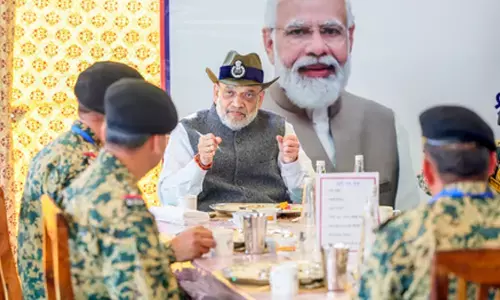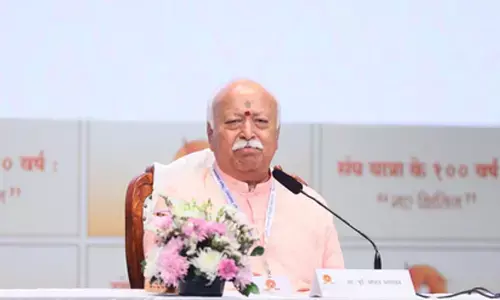Zomato uniform colour changes from green to red, sparks debate
Share :

Ahead of the Holi colours bash, the food delivery major Zomato has ‘changed’ its colours from green to red even for rushing vegetarian deliveries to its customers across India, sparking a colourful debate on social media.
Mumbai: Ahead of the Holi colours bash, the food delivery major Zomato has ‘changed’ its colours from green to red even for rushing vegetarian deliveries to its customers across India, sparking a colourful debate on social media.
The Zomato Founder-CEO Deepinder Goyal made the announcement – with a lengthy justification – on the move that has evoked a mixed reaction from different quarters.
Henceforth the company said it will paint its dedicated fleet of ‘green’ vehicles to red even for the veggy customers’, making them unidentifiable on the ground – though they would serve only vegetarian orders.
All the riders – the regular fleet and the vegetarian fleet – shall also sport the red colour, doing away with the on-ground segregation, said Goyal.
Justifying the decision, he said that this would ensure that Zomato’s red uniform delivery partners are not wrongly associated with non-veg food and get blocked by resident welfare associations or housing societies that could pose risk to the riders’ physical safety.
In some cases, even its customers could face trouble with their landlords which the company would not relish, enabling the non-vegetarian customers to now safely use Zomato to order their favourite meaty cuisine.
Defending the move for a separate ‘green fleet’, Goyal said that while this feature strictly served a dietary preference irrespective of caste-religion, despite best efforts earlier, occasionally the (non-veg) food spilled onto the delivery boxes, carrying the smell to the next order, irking customers.
Reacting to the colour-change, the Telangana Gig and Platform Workers Union President Shaik Salauddin asked Goyal to clarify whether Zomato would now filter out its male-female riders who are only vegetarians on the basis of caste, religion or community, to serve its pure-veg fleet.
Salauddin reminded the Zomato CEO how it had stood by a minority community rider after a customer grumbled about having to receive his order from a Muslim delivery boy.
However, Goyal has kept an open mind on the issue and assured he listens to customers and takes necessary action depending on feedback, and is ready to swallow ego and pride.
Social media pundits immediately reacted by putting up national and state-wide statistical data of the last National Family Health Survey-5, which revealed that only 19 per cent of Indians are ‘pure vegetarians’, plus women (25 per cent) outnumber men (13 per cent) in consuming greens.
In the state/UT-wise percentage rankings for vegetarians, Rajasthan and Haryana are tops (56 per cent each), Gujarat (51), Punjab (47), Madhya Pradesh (42), Himachal Pradesh (35), Uttar Pradesh (32), Delhi (21) Maharashtra (19), Uttarakhand (18), Dadra & Nagar Haveli (17), Karnataka (13), Chhattisgarh (11) and Bihar (10 per cent).
In the single-digit list is: Jammu & Kashmir and Sikkim (9 per cent each), Ladakh (6), Jharkhand (4.7), Odisha (3.9), Goa (3.5), Andhra Pradesh and Telangana (2.7 each), Tamil Nadu (2.3), Puducherry (1.5) and Kerala (1.1 per cent),
The remaining states/Uts are in fractions: West Bengal (0.7 per cent), Assam (0.5), Tripura, Meghalaya and Andaman & Nicobar Isles (0.3 each), Arunachal Pradesh (0.2), Mizoram, Manipur and Nagaland (0.1 each), while Lakshadweep is 100 per cent non-vegetarian.







